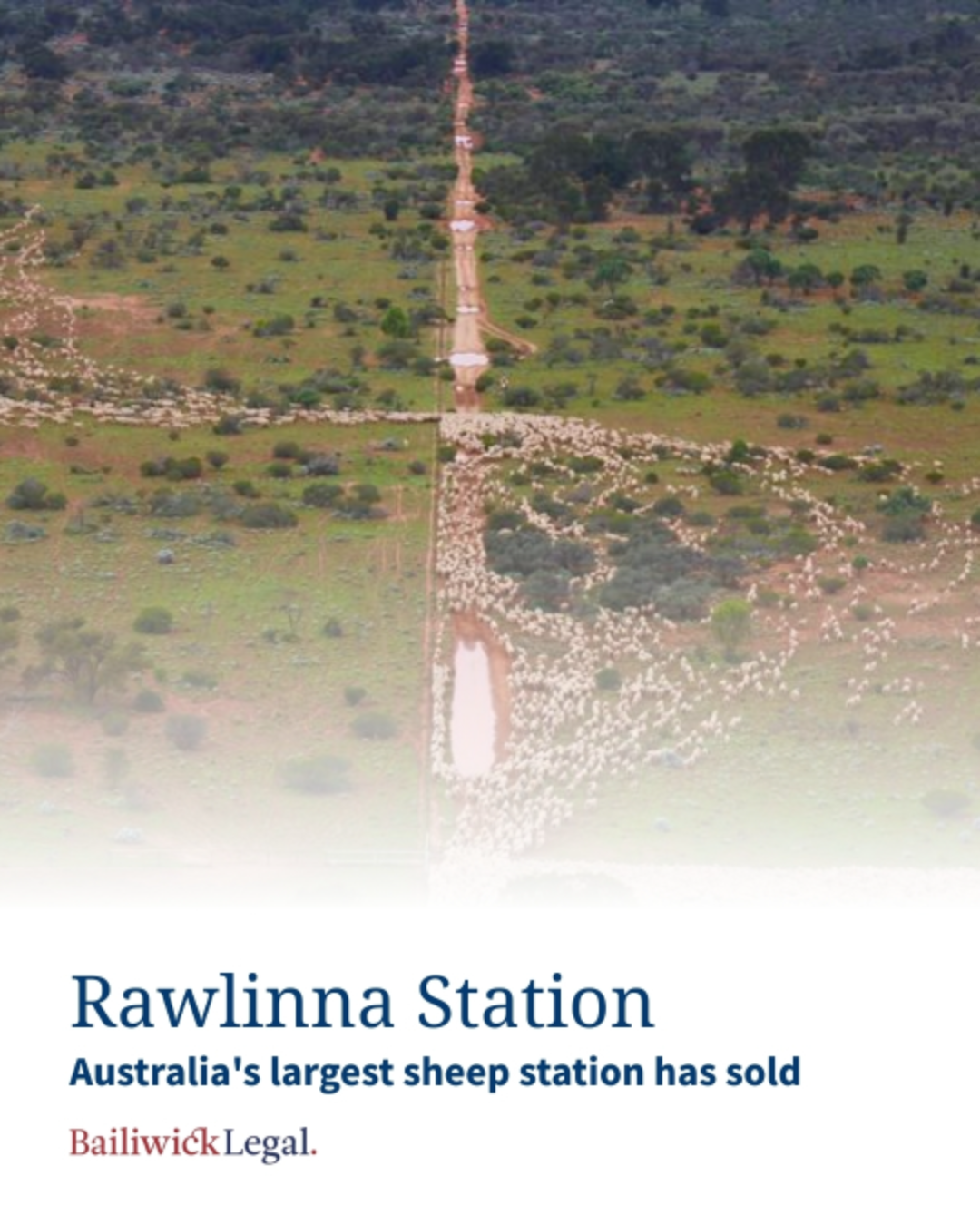Playing Fair with the Family Farm - Disputes regarding family farms
February 19, 2026
Author name
Playing fair with the family farm - Succession, disputes ...
Rural enterprises, like many small to medium sized businesses are typically a ‘family affair’. Mum and dad work together, the business and land are in their name and/or control, and the children help according to their age and ability. This scenario usually works well while dependent children are still learning essential industry skills from senior family members.
Once children have grown to adulthood and begin to consider their place within the family business structure, formerly productive working arrangements can change dramatically. Who will farm the land, run the associated business, live at the homestead and ultimately inherit the property? In families where there are a number of siblings, these types of questions can cause bitter family divisions if they have not been dealt with honestly and openly by parents.
The addition of spouses and another generation of offspring usually creates a tipping point within the family dynamic whereby unmet expectations rise and poor communication can threaten to destroy a lifetime of hard work.
There have been many cases where grown children have been forced into court to enforce promises made by their parents. Usually they work for little comparative remuneration on the promise that the family farm and its associated business will be theirs at some point in the future.
Generally, nothing is ever written down and as the years pass, no property is ever legally transferred from one family member to another. Adult children pass up other employment opportunities and eventually find themselves waiting for an inheritance or financial interest that may never come their way. This type of situation can give rise to a claim of equitable estoppel, which essentially means that any promise made to a child in this kind of circumstance should be kept.
There are also situations where the actions and behavior of the parents have led the child to reasonably believe that they will be rewarded for their endeavors and input into the family business, even if this has never been stated. In these instances, the courts will look at their contribution to the business and the intention shown by all those concerned that they had a ‘stake’ in the successful operation of the rural enterprise.
Adult children who work on their parent’s farm may believe that their interest in the property has been clearly established by an unspoken understanding that they will inherit the property. This can give rise to a claim that a constructive trust exists on the grounds that it would be unconscionable for the parents to maintain beneficial ownership when it is clear that the child is working to benefit the family business.
A lack of communication and/or an unwillingness to acknowledge and commit to a decision can often lead to expensive legal action. It is essential to remember that these types of dispute have the ability to decimate a family’s business interests and irrevocably tear relationships apart.
For further information or guidance regarding these issues please call us at 9321 5451.

Bailiwick Legal has been honoured to support Forever Wild over the past few years as they delivered one of the most significant conservation land acquisition programs undertaken in Western Australia. Our team assisted Forever Wild with the strategic purchase of four pastoral stations, Narndee , Boodanoo , Meeline and Challa , transactions that now connect three State Reserves and protect more than 12,000 square kilometres of land. To put that scale into perspective, the combined area is approximately five times the size of the ACT and nearly one-fifth the size of Tasmania . Navigating complexity at scale These were not straightforward property transactions. Each acquisition involved: Multiple pastoral leases Layered regulatory and approval pathways Significant operational and on-ground assets Numerous stakeholders across government, industry and land management Our role was to guide Forever Wild through this complexity with clarity, precision and confidence, ensuring each transaction progressed efficiently while managing risk and safeguarding long-term objectives. “ Forever Wild is creating a world-leading model for nature funding that demonstrates we can manage viable, working pastoral stations whilst also restoring and protecting local ecological flora and fauna, and engaging and supporting Indigenous people and local communities. Complex & challenging, but this initiative could literally change the world .” Jessica Brunner - Director, Bailiwick Legal A growing and evolving legal landscape Large-scale conservation acquisitions sit within an emerging and increasingly complex legal field , intersecting land tenure, pastoral regulation, environmental frameworks and commercial considerations. These matters demand a deep understanding of both the legal mechanics and the practical realities of operating in regional and remote Australia. Our team’s experience in agribusiness, pastoral land transactions and regulatory approvals allowed us to support Forever Wild at every stage, from strategic structuring through to completion. Proud to support leadership in nature finance Forever Wild is widely recognised as an industry leader and a steadfast advocate for nature finance initiatives , helping pave the way for greater accessibility and innovation in conservation funding and land stewardship. We are proud to have contributed our relationships, expertise and practical legal insight to help Forever Wild achieve its vision, and to have played a role, however small, in shaping a groundbreaking future for conservation in Australia. At Bailiwick Legal, we value the opportunity to work alongside organisations that are thinking long-term, acting boldly, and creating outcomes that extend well beyond the transaction itself. For assistance with all of your agribusiness needs, contact Bailiwick Legal on 08 9321 5451 or email office@bailiwicklegal.com.au For further information about our legal services, please visit our website: https://www.bailiwicklegal.com.au The above information is a summary and overview of the matters discussed. This publication does not constitute legal advice and you should seek legal or other professional advice before acting or relying on any of the content.

Bailiwick Legal Advises on Landmark Acquisition of Rawlinna Station by Consolidated Pastoral Company
Bailiwick Legal is proud to have acted for Consolidated Pastoral Company (CPC) in its successful acquisition of Rawlinna Station , Australia’s largest sheep station, located on the remote Nullarbor Plain in Western Australia. Spanning over 1 million hectares and running approximately 30,000 sheep , Rawlinna is an iconic pastoral asset with a rich legacy, having been held by the MacLachlan family’s Jumbuck Pastoral Company since its establishment in 1962. The sale marks the first change of ownership in over six decades and was finalised following formal approval from the Western Australian Government for the transfer of the pastoral leases. This transaction involved navigating: The transfer of three separate pastoral leases Coordination across multiple vendor entities Consideration of livestock and operating assets Fulfilment of regulatory and compliance requirements, including WA lease approval processes Bailiwick Legal is a boutique agricultural and regional law firm , proudly based in Perth and Bridgetown, Western Australia. Our role in this acquisition demonstrates that deep sector knowledge, local insight, and personalised legal support are crucial for agribusiness clients managing complex, high-value transactions. Our team, led by our regionally-based solicitor, Matilda Lloyd, provided end-to-end legal and strategic support, including: Due diligence on land tenure and operating assets Contract negotiation and preparation Advice on regulatory approvals and compliance Strategic coordination with CPC’s internal and external stakeholders to ensure a smooth and timely settlement We are honoured to have supported CPC in this milestone acquisition and look forward to watching Rawlinna’s next chapter unfolds. At Bailiwick Legal, we believe that regional expertise, deep industry knowledge, and relationship-based service remain essential to agribusiness success, no matter the scale. Congratulations to all parties involved, including the MacLachlan family, whose stewardship of Rawlinna leaves a lasting legacy in Australian agriculture. – The Bailiwick Legal Team Working alongside agribusinesses to grow, transition, and thrive . For assistance with all of your agribusiness needs, contact Bailiwick Legal on 08 9321 5451 or email office@bailiwicklegal.com.au By Matilda Lloyd (Associate) For further information about our legal services, please visit our website: https://www.bailiwicklegal.com.au The above information is a summary and overview of the matters discussed. This publication does not constitute legal advice and you should seek legal or other professional advice before acting or relying on any of the content.











